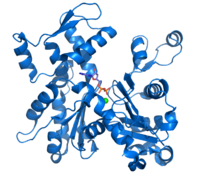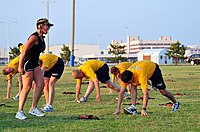
Acute effects of two caffeine doses on bar velocity during the bench press exercise among women habituated to caffeine: a randomized, crossover, double-blind study involving control and placebo conditions
Sign Up to like & getrecommendations! Published in 2021 at "European Journal of Nutrition"
DOI: 10.1007/s00394-021-02708-8
Abstract: The main goal of this study was to evaluate the effectiveness of two different doses of caffeine (3 and 6 mg/kg) to enhance bar velocity during the bench press in women habituated to caffeine. Twelve… read more here.
Keywords: caffeine; velocity; bar velocity; women habituated ... See more keywords

Muscle activity in asymmetric bench press among resistance-trained individuals
Sign Up to like & getrecommendations! Published in 2020 at "European Journal of Applied Physiology"
DOI: 10.1007/s00421-020-04476-5
Abstract: Purpose To determine the effects of asymmetric loads on muscle activity with the bench press. Method Seventeen resistance-trained men performed one familiarization session including testing one repetition maximum (1RM) and three 5 repetition maximum (RM)… read more here.
Keywords: muscle; muscle activity; resistance; bench press ... See more keywords

Low-load bench press and push-up induce similar muscle hypertrophy and strength gain
Sign Up to like & getrecommendations! Published in 2017 at "Journal of Exercise Science and Fitness"
DOI: 10.1016/j.jesf.2017.06.003
Abstract: Aim To investigate the effect of push-up training with a similar load of to 40% of 1- repetition maximumal (1RM) bench press on muscle hypertrophy and strength gain in men. Methods Eighteen male participants (age,… read more here.
Keywords: muscle; group; press; load ... See more keywords

Influence of different attentional focus on EMG amplitude and contraction duration during the bench press at different speeds
Sign Up to like & getrecommendations! Published in 2018 at "Journal of Sports Sciences"
DOI: 10.1080/02640414.2017.1363403
Abstract: ABSTRACT The purpose of this study was to investigate whether using different focus affects electromyographic (EMG) amplitude and contraction duration during bench press performed at explosive and controlled speeds. Eighteen young male individuals were familiarized… read more here.
Keywords: focus; emg amplitude; different attentional; contraction duration ... See more keywords

Does relative strength influence bench press kinematics in resistance-trained men?
Sign Up to like & getrecommendations! Published in 2022 at "Journal of Sports Sciences"
DOI: 10.1080/02640414.2022.2148075
Abstract: ABSTRACT The aim of the present study was to examine whether relative strength influences lifting kinematics (e.g., lifting time, barbell velocity, vertical displacement) during the bench press (BP) exercise with healthy men. Loaded BP 6-repetition… read more here.
Keywords: bench press; kinematics; resistance trained; relative strength ... See more keywords

Is the diurnal variation in muscle force output detected/detectable when multi-joint movements are analysed using the musclelab force–velocity encoder?
Sign Up to like & getrecommendations! Published in 2018 at "Chronobiology International"
DOI: 10.1080/07420528.2018.1485685
Abstract: ABSTRACT We have investigated the magnitude of diurnal variation in back squat and bench press performance using the MuscleLab force velocity transducer. Thirty resistance-trained males (mean ± SD: age 21.7 ± 1.4 years; body mass… read more here.
Keywords: back squat; bench press; force; velocity ... See more keywords

Effects of an active warm-up on variation in bench press and back squat (upper and lower body measures)
Sign Up to like & getrecommendations! Published in 2019 at "Chronobiology International"
DOI: 10.1080/07420528.2018.1552596
Abstract: ABSTRACT The present study investigated the magnitude of diurnal variation in back squat and bench press using the MuscleLab linear encoder over three different loads and assessed the benefit of an active warm-up to establish… read more here.
Keywords: back squat; active warm; bench press; press back ... See more keywords

The influence of isometric preload on power expressed during bench press in strength-trained men
Sign Up to like & getrecommendations! Published in 2017 at "European Journal of Sport Science"
DOI: 10.1080/17461391.2016.1222000
Abstract: Abstract The purpose of this study was to compare the power expressed during the bench press exercise in resistance-trained men following different pre-activation conditions. Twenty-two trained men (age 24.1 ± 1.7 years, height 178.6 ± 6.1 cm, body mass 81.1 ± 10.6 kg)… read more here.
Keywords: bench press; trained men; isometric preload; power ... See more keywords

The effects of unknown additional eccentric loading on bench-press kinematics and muscle activation in professional handball and rugby players
Sign Up to like & getrecommendations! Published in 2019 at "European Journal of Sport Science"
DOI: 10.1080/17461391.2019.1694587
Abstract: Abstract This study aimed to investigate the influence of unknown additional eccentric loading on bench-press kinematics (peak velocity, peak acceleration and accelerative percentage of the concentric phase) and muscle activation (pectoralis major and anterior deltoid)… read more here.
Keywords: unknown additional; additional eccentric; muscle activation; kinematics ... See more keywords

Effects of Performing Isometric Bench Press Training at Single Versus Multiple Joint Positions on Strength and Power Performance.
Sign Up to like & getrecommendations! Published in 2022 at "International journal of sports physiology and performance"
DOI: 10.1123/ijspp.2021-0461
Abstract: Isometric strength training has been reported to benefit various sport-related dynamic performances. However, it is still unknown whether performing isometric strength training at single or multiple joint angles would elicit greater benefit. PURPOSE To compare… read more here.
Keywords: strength; bench press; power; training ... See more keywords

Specific Adaptations to 0%, 15%, 25%, and 50% Velocity-Loss Thresholds During Bench Press Training.
Sign Up to like & getrecommendations! Published in 2022 at "International journal of sports physiology and performance"
DOI: 10.1123/ijspp.2021-0481
Abstract: PURPOSE To compare the effect of 4 velocity-loss (VL) thresholds-0% (VL0), 15% (VL15), 25% (VL25), and 50% (VL50)-on strength gains, neuromuscular adaptations, and muscle hypertrophy during the bench press (BP) exercise using intensities ranging from… read more here.
Keywords: bench press; loss thresholds; velocity; group ... See more keywords